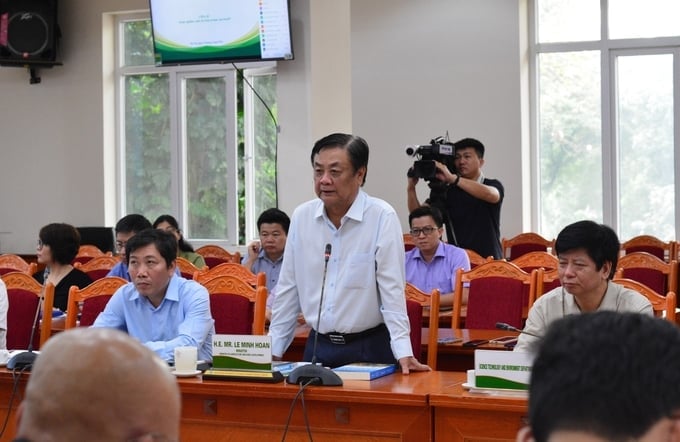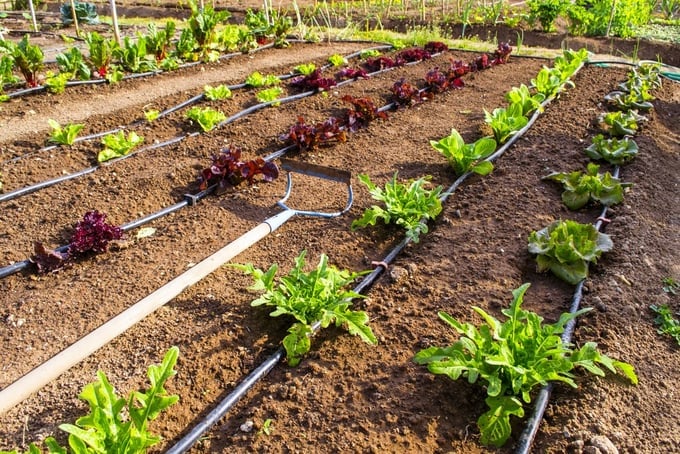May 21, 2025 | 08:34 GMT +7
May 21, 2025 | 08:34 GMT +7
Hotline: 0913.378.918
May 21, 2025 | 08:34 GMT +7
Hotline: 0913.378.918
On the morning of May 10, the Ministry of Agriculture and Rural Development organized a seminar on "Israel's Desert Farming Experience". The seminar was held both in-person and online across 43 provinces and municipalities, aiming to share Israel's experiences in agricultural development amidst climate change, natural disasters, and salinity.
Minister of Agriculture and Rural Development Le Minh Hoan shared impressive experiences from his first visit to Israel and witnessing the development of desert agriculture, the signs of a small country in terms of area but with great innovations.
From there, Minister Le Minh Hoan hopes that through the seminar, Vietnam's agricultural sector can learn from the world's leading agricultural exporter, especially in the field of exporting high-tech agricultural technology and equipment.

On the morning of May 10, the Ministry of Agriculture and Rural Development organized a seminar on "Israel's Desert Farming Experience". Photo: Thao Phuong.
"Vietnam used to be proud of its abundant water resource, but in the face of harsh climate change, we now need solutions in agricultural production technology under water scarcity conditions now. In the era of drought, the world is facing the risk of water shortage. Therefore, what Israel is doing has brought hope to countries including Vietnam to turn the abnormal into the normal," Minister Le Minh Hoan stated.
At the seminar, Israeli Ambassador to Vietnam Yaron Mayer stated that Israel has faced many challenges such as drought and water scarcity. However, with the perspective of turning challenges into opportunities supported by technology, Israel no longer suffers from water scarcity and can provide water for agriculture and other activities.
The Israeli ambassador stated that to ensure livelihoods for the people and develop agriculture, the country has developed and applied core technologies such as water-saving technology, sprinkler irrigation, water reuse, desalination of seawater into freshwater, and building water storage infrastructure. Ambassador Mayer also mentioned that to promote water resource protection, the country has also launched campaigns to raise awareness among people about water conservation.
Sharing at the seminar, Mr. Gal Saf, Commercial Counsellar of Israel, quoted data from the World Resources Institute stating that 45% of the world's population will live in conditions of freshwater scarcity by 2050. With such pressure on freshwater, Israel also faces some disadvantages in water sources, stemming from its geographical position (60% being desert); the large water supply needs to serve 9 million people, irrigate 200,000 hectares of agricultural land, as well as prolonged severe droughts.
To overcome these challenges, Israel has launched a "parallel action" campaign to "create" more water through recycling, reuse, and desalination, etc. Also, using less water from existing sources in agriculture, such as using drip irrigation technology, greenhouse technology, and shade house.

Minister Le Minh Hoan hopes that through the seminar, Vietnam's agricultural sector can learn from the world's leading agricultural exporter, especially in the field of exporting high-tech agricultural technology and equipment.
Additionally, Israel advocates creating more "water channels" through government intervention, thereby regulating reused treated wastewater for agriculture, recycled water for agriculture and industry, desalination of seawater and brackish water, and developing national and regional infrastructure.
Ambassador Yaron Mayer affirmed that Israel has cooperated with India and Vietnam on models and technologies such as drip irrigation and intercropping. Israel is very willing to share core technologies and provide financial support and investment through Israeli technology companies.
According to Ambassador Yaron Mayer, Vietnam has many highly specialized research institutes, and through the visit of the Israeli delegation with leading water, irrigation, and agriculture companies to visit provinces and cities in Vietnam, Israel will gain a specific picture of each region and from there can seek specific cooperation opportunities.
From the experiences shared by experts at the seminar, Minister Le Minh Hoan was impressed with the keyword "water-saving culture" of the Israeli people. The Minister believes that if technology and finance are sufficient conditions, then the spirit, will, and water-saving culture are necessary conditions for Israel to bring core technologies such as drip irrigation technology.

Israeli Ambassador to Vietnam Yaron Mayer. Photo: Thao Phuong.
The Minister believes that there needs to be a change in the mindset of agriculture to prioritize resource exchange, exchanging water and land resources to achieve high yields. Therefore, the issue of costs for agriculture needs to be re-evaluated, even though it is not an easy journey due to long-standing farming practices.
"We need to help people understand and be aware that water is not an infinite resource, and overexploitation of water has caused consequences without sufficient warnings for this issue," the Minister said.
The Minister proposed that both sides conduct further research to prepare for a deeper seminar on water-saving agriculture, looking at it from Israel's perspective and lessons for Vietnam.
The leaders of the Ministry of Agriculture and Rural Development proposed that Israel support the agricultural sector in changing its approach to water-scarce agriculture policies.

Additionally, Israel advocates creating more "water channels" through government intervention, thereby regulating reused treated wastewater for agriculture, recycled water for agriculture and industry. Photo: TL.
With the advantages of the historical relationship between the two countries and the Vietnam-Israel Free Trade Agreement (VIFTA) signed in 2023, Minister Le Minh Hoan suggested that Ambassador Yaron Mayer discuss with the Israeli Minister of Agriculture about renewing the Memorandum of Cooperation between the two agricultural ministries since 2016, including agricultural cooperation in the context of water scarcity, efficient irrigation, etc.
Additionally, the Minister proposed that Israel enhance exchange programs and learning opportunities for Vietnamese agricultural interns so that students can live and study in farm and cooperative environments in Israel. This will be a source of high-quality agricultural labor in the future.
The Minister also suggested that experts from Israel introduce the concept of micro-irrigation to Vietnam, starting with small and simple models and expanding the model from the initial results. Additionally, support the localization of Israeli irrigation technologies produced in Vietnam at reasonable prices to facilitate Vietnamese farmers' access to these technologies.
Translated by Dieu Linh

(VAN) In 2024, over 295 million people across 53 countries and territories faced acute hunger—an increase of almost 14 million people compared to 2023, while the number of people facing catastrophic levels of hunger reached a record high.

(VAN) World Environment Day 2025 (June 5) carries the theme 'Beat Plastic Pollution' continuing to emphasize the global urgency of addressing the plastic waste crisis.

(VAN) This was the assessment shared by experts at the workshop titled 'Assessing the Role and Potential of Low-Emission Rice Production Systems in Vietnam,' held on the morning of May 19.

(VAN) Cai Rong Port is the fisheries control center of Quang Ninh, helping to monitor fishing vessels, combat IUU fishing, and remove the EC's 'yellow card'.

(VAN) The German Agricultural Society (DLG) explores the possibility of establishing a mechanization service center in Vietnam’s Mekong Delta to support farmers in accessing and utilizing advanced machinery.

(VAN) On May 16, the Department of Water Resources Management, in collaboration with the Food and Agriculture Organization of the United Nations (FAO), held a signing ceremony for the GEF-8 project document.

(VAN) Food safety, mechanization, vocational training, and market opening are key areas of cooperation expected between the Vietnamese Government and the Federal Republic of Germany.